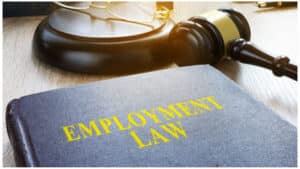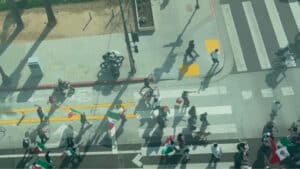
Following an article I wrote recently on jury selection, I was contacted by a Stephen W., a psychiatrist, who asked that I inform people who suffer from disabling conditions about their rights if called for jury selection. I was reluctant to write this article, as I do not want to provide people with excuses to try and get out of jury service. However, I have personally observed over the past 25 years that there are people with disabilities, both physical and mental/emotional, for whom jury service may be ill-advised or damaging.
Jury service is a civic duty. The right to a jury trial is one of the fundamental rights all Americans possess, ensconced within the Bill of Rights, the first ten amendments to the Constitution, and the Seventh Amendment. Interestingly enough, there is no right to vote contained in the Bill of Rights. Not until 1870, following the civil war, was the Fifteenth Amendment passed which stated that “the right of citizens of the United States to vote shall not be denied or abridged by the United States or by any State because of race, color, or previous condition of servitude [slavery].”
Jury service is a fantastic experience in participatory democracy. You and twelve ordinary citizens, after listening to the facts of a case, and the instructions on the law given by the judge, get together in a room and deliberate. Webster’s Dictionary defines “deliberate” as “to think about or discuss issues and decisions carefully.”
Jurors are identified by voter roles and DMV records and are chosen at random. The local jury commissioner issues subpoenas through the mail. California law provides that a juror may be summoned only once a year. Some trials are longer than others. For example, a criminal misdemeanors trial for shoplifting may take a day, whereas a murder trial may take several months. Likewise, a civil trial for a simple rear-end collision may be a day long, whereas a complicated wrongful death case or employment discrimination case may take weeks or months. The longest trial I have ever participated in was an employment case that lasted three and a half months.
There are penalties for any prospective trial juror who has been summoned for service and fails to attend as directed. Pursuant to California Civil Code Section 209, a judge may issue a warrant of attachment compelling a person who fails to respond to a juror summons to come before the judge. Following a hearing, the court may find a prospective juror in contempt of court, a crime punishable by fine, incarceration, or both.
Nevertheless, under Code of Civil Procedure Section 228, a prospective juror may be disqualified at the judge’s discretion if they have an incapacity which makes them unable to perform the duties of a juror. The California Rules of Court Rule 2.1008(d) states reasons for which a judge may grant an excuse from jury duty, including when a prospective juror:
- Lacks “reasonably available means of public or private transportation to the court”
- Must travel in excess of 1.5 hours from home to the court
- Would bear extreme financial burden taking into consideration their income, expected length of jury service, availability of reimbursement for lost income, risk of compromising their ability to support themself and any dependants, and other unjust outcomes
- Would unduly and unavoidably risk material injury to their property
- Is “immediately needed for the protection of the public health and safety” to prevent “substantially reducing essential public services”
- Is required for the personal care and attention of a dependant with no comparable economical substitute
Finally, and relevant to your question, a judge may grant a prospective juror excusal from service if they have “a physical or mental disability or impairment, not affecting that person’s competence to act as a juror, that would expose the potential juror to undue risk of mental or physical harm.”
Prospective jurors who believe that they medically or psychologically cannot sit as jurors should come to court on the date of their summons with a letter from their physician, psychologist or psychiatrist. Before jury selection, the judge will ask the assembled prospective jurors if they have a hardship which would preclude them from jury service. Those who believe they do will be allowed to fill out a hardship questionnaire. That is the time to inform the judge of your disability, supported by documentation verifying appropriate impairments and detailing their probable duration and impacts on ability to serve as a juror. If such an individual is aged 70 years or older, no documentation is required. They will then review your request, may ask for a letter or further explanation, and will grant or deny your request as appropriate.
A juror with a disability may alternatively be entitled to an accommodation so that the prospective juror can participate in the trial. California Civil Code Section 224 states, “The court shall appoint a service provider whose services are needed by a juror with a disability to facilitate communication or participation.” Available services include court-appointed sign language interpreters, oral interpreters, or deaf-blind interpreters. Likewise, a juror may ask for breaks, the ability to stand or even lie down. (Yes, one time I had a juror with a bad back who was allowed to lie down during the trial with her head propped up so she could see the evidence)
Some prospective jurors may seek disqualification due to a special vulnerability to emotional distress given the facts of the case at hand. In a case I tried several years ago, a prospective juror indicated they suffered from depression and felt that the case we were about to try, involving a woman claiming severe emotional distress, would be emotionally damaging to her. The judge, after hearing from the prospective juror, and observing her demeanor, dismissed her from further jury service. In another case, involving gynecological malpractice leading to the death of a baby, the judge excused a prospective juror who was pregnant and felt that it would be psychologically traumatizing for her to hear the facts in the case. Moreover, criminal trials for rape, assault, sexual abuse or death of a loved one may involve facts which are too intense for some people who may have suffered from similar crimes. If the facts of a particular case are the basis for a hardship, the judge may dismiss such a juror or send them back to the Jury Commissioner for assignment to a different type of case.
As a trial lawyer I encourage everyone to serve as a juror. Jurors are essential to our system of justice and, if you were a defendant or plaintiff, you would want a fair jury of your peers to hear your case.










